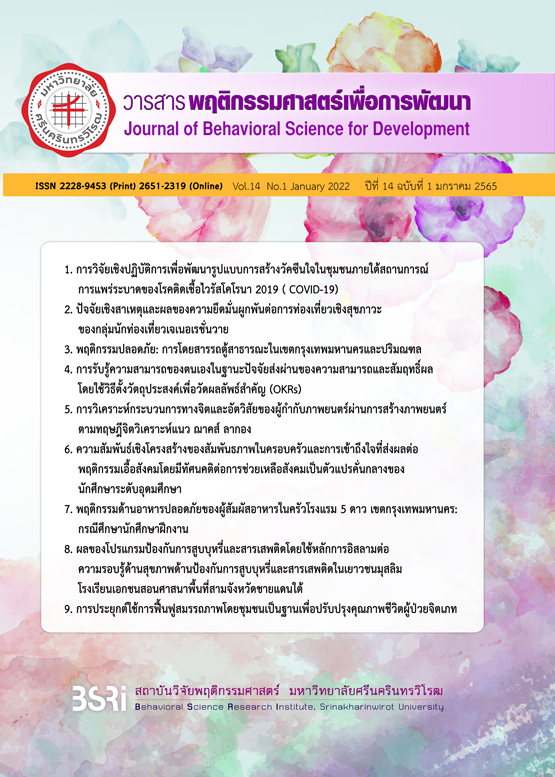Action Research for Development of Enhancing Community Vaccines Model in The Situation of COVID-19 Outbreak
Keywords:
community vaccines, COVID-19 outbreak, action researchAbstract
This study focuses on developing community vaccines. Action Research was applied. Pak Phli District, Nakhon Nayok Province, and Mae Wang District, Chiang Mai province were selected as a model community that participants in the community participated in this study. The study is divided into 2 phases: Phase 1: Workshop research to create and develop a form of vaccine for the mind in the community. Phase 2: synthesizes the form and creates a guideline to create a vaccine for the mind in the community. Qualitative method and Content Analysis were used. The results showed that the model of building and developing of vaccine of mind consist of 5 steps which are 1) searching for community capital and community potential 2) building a multi-level network 3) defining a mind vaccine target by using community bond and potential based on 4 Build 2 Use 4) implementation and refection and 5) community jointly monitoring. The outcomes for mental health change after participating in the model as the following: 1) having the ability to manage emotions, 2) feeling safe and trusting, 3) living with goals and hope. From the results, the model can be extended to other areas to encourage communities to cooperate in the face of various crises, to be able to prevent, solve problems, and quickly recover to normal conditions. However, some adjustment for different context might be needed. Lasty, it is important to build multi-network levels’ co-operation to promote a successful co-operation and drive further policy.
References
Boyatzis, R. E. (2006). An overview of intentional change from a complexity perspective. Journal of Management Development, 25(7), 607-623.
Bundasak, T., Chaowiang, K., Sittisongkram, S., & Poysungnoen, P. (2019). botbāt phayābān nai kāndūlǣ bukkhon thī mī phāwa wikrit thāng čhitčhai [Nursing Roles to Help Individuals Who Have a Psychological Crisis]. The Journal of Prapokklao Hospital Clinical Medical Education Center, 36(1), 82-89.
Ganor, M., & Ben-Lavy, Y. (2003). Community resilience: Lessons derived from Gilo under fire. Journal of Jewish Communal Service, 79(2/3), 105-108.
IFRC. (2014). IFRC framework for community resilience. International Federation of Red Cross and Red Crescent Societies.
Inchausti, F., MacBeth, A., Hasson‐Ohayon, I. & Dimaggio, G. (2020). Psychological intervention and COVID‐19: What we know so far and what we can do. Journal of Contemporary Psychotherapy, 50(4), 243-250.
International Federation Reference Centre for Psychosocial Support. (2009). Community-based psychosocial support. A training kit. PS Centre Publications.
Lerch, D. (2016). Six foundations for building community resilience. Post Carbon Institute.
Li, W., Liu, Z., Zhao, Y., Zhang, Q., Zhang, L., Cheung, T., & Xiang, Y. (2020). Progression of mental health services during the COVID-19 outbreak in China. International Journal of Biological Sciences, 16(10), 1732-1738.
Maslow, A. (1970). Motivation and Personnality. Harper and Row Publishers.
Norris, F. H., Stevens, S. P., Pfefferbaum, B., Wyche, K. F., & Pfefferbaum, R. L. (2008). Community resilience as a metaphor, theory, set of capacities, and strategy for disaster readiness. American Journal of Community Psychology, 41(1-2), 127-150.
Phrakruwirojkanchanaket & Phragrusirikanchanabhiraksa. (2020). wipatsanā kammathān phœ̄m phalangčhit sū phai khō wit - sipkāo: botrīan čhāk ʻong dā lailā ma [Vipassana Meditation Adding Psychic Power to the Disaster of Covid– 19: Lessons from the Dalai Lama]. Journal of Arts Management, 4(2), 409-418.
Wongpiromsarn, Y. (2018). botrīan dān sukkhaphāp čhit nai phai phibat: kō̜ranī kān chūailư̄a thīm mūpā phlat long nai tham lūang [Lesson learned in disaster mental health from Tham Luang Cave rescue]. Journal of Mental Health of Thailand, 26(2), 152-159.
Youngwarasawasd, R., & Somkittikanon, P. (2020). kānčhatkān khwāmkhrīat thāng kānngœ̄n nai chūang kān rabāt khō̜ng rōk titchư̄a wairat khōrōnā sō̜ngphansipkāo [Coping with Financial Stress During the Coronavirus 2019 Pandemic]. Journal of Health and Health Management, 6(1), 1-9.
Downloads
Published
How to Cite
Issue
Section
License
Copyright (c) 2022 Journal of Behavioral Science for Development

This work is licensed under a Creative Commons Attribution-NonCommercial-NoDerivatives 4.0 International License.



